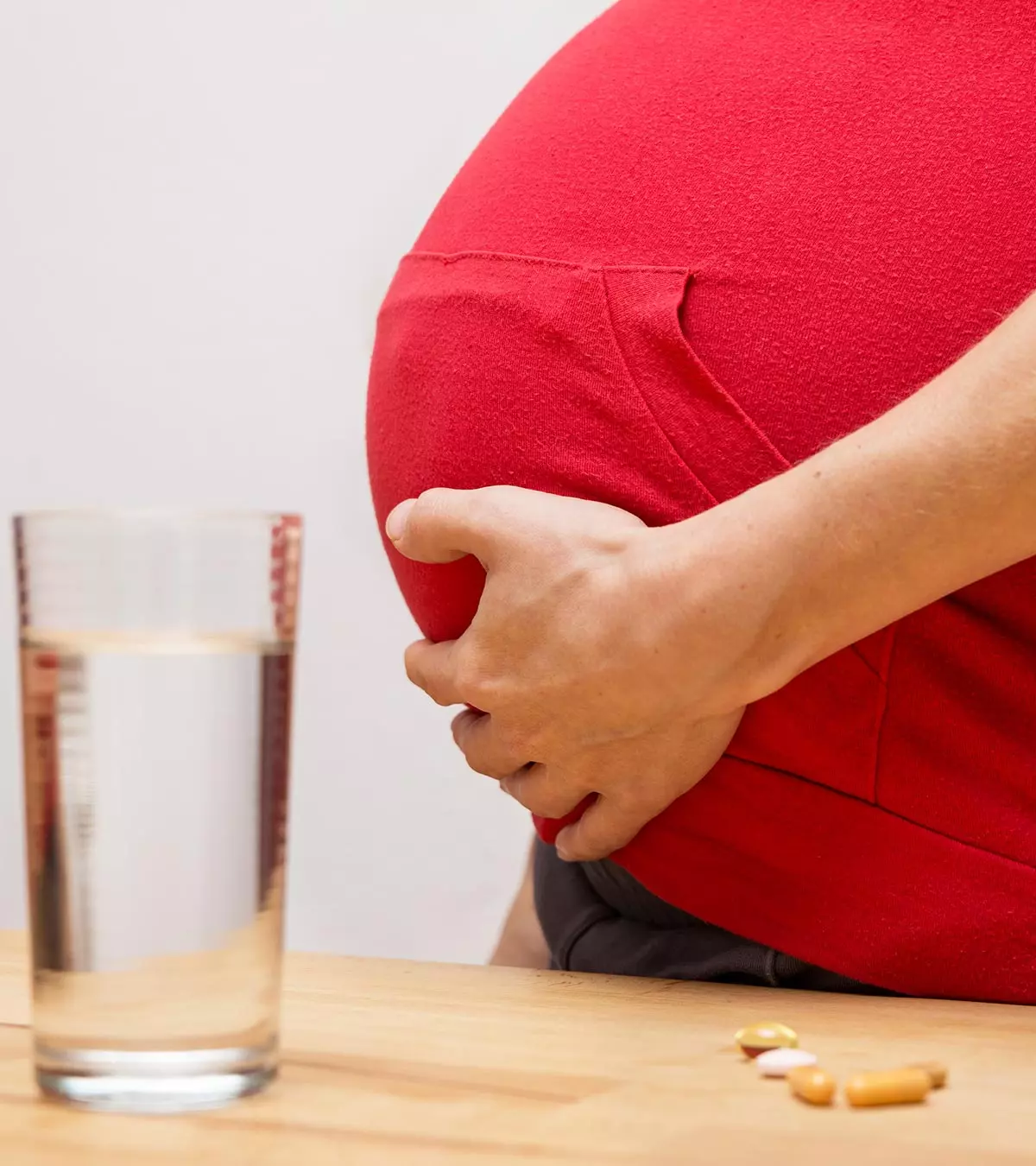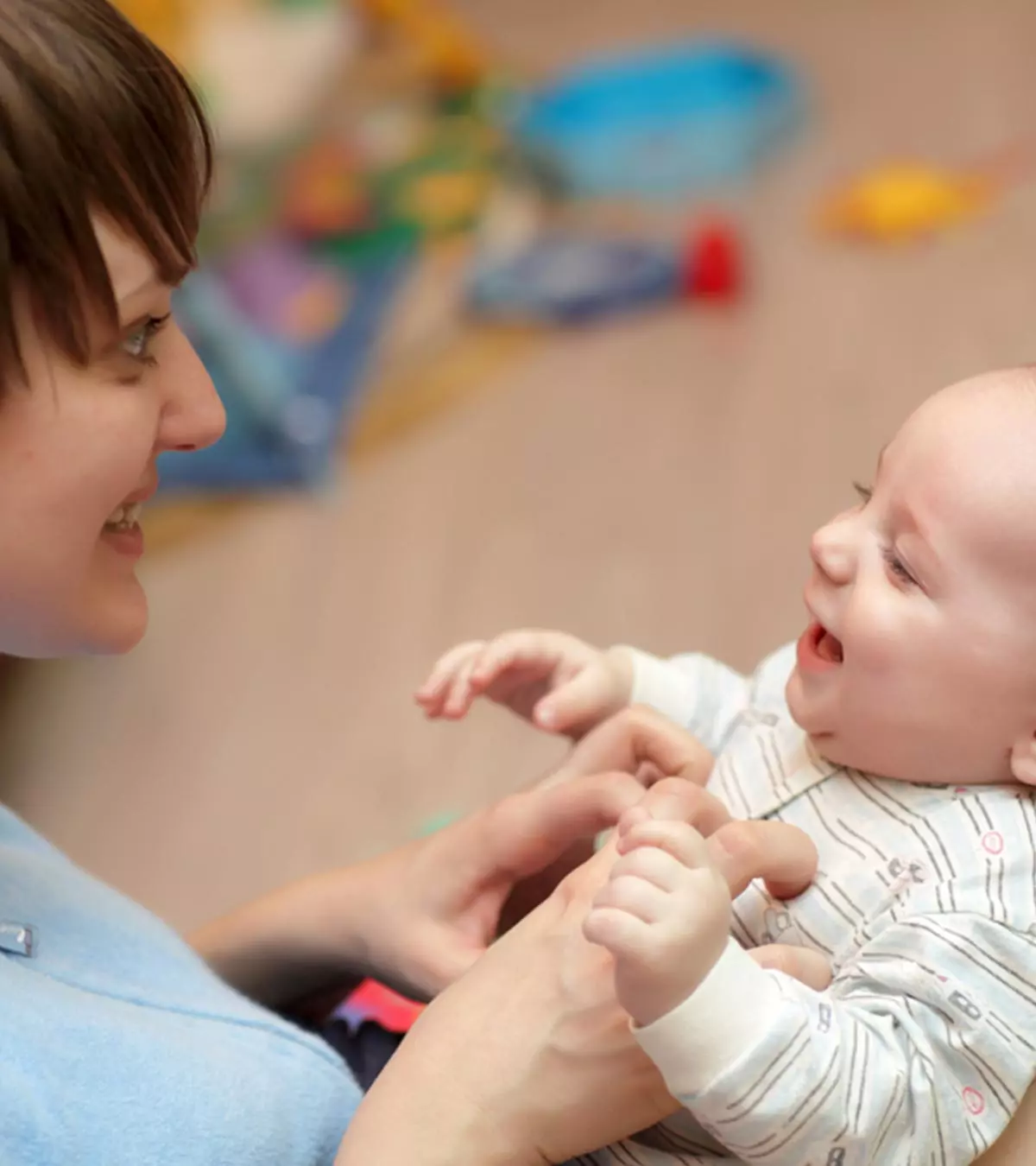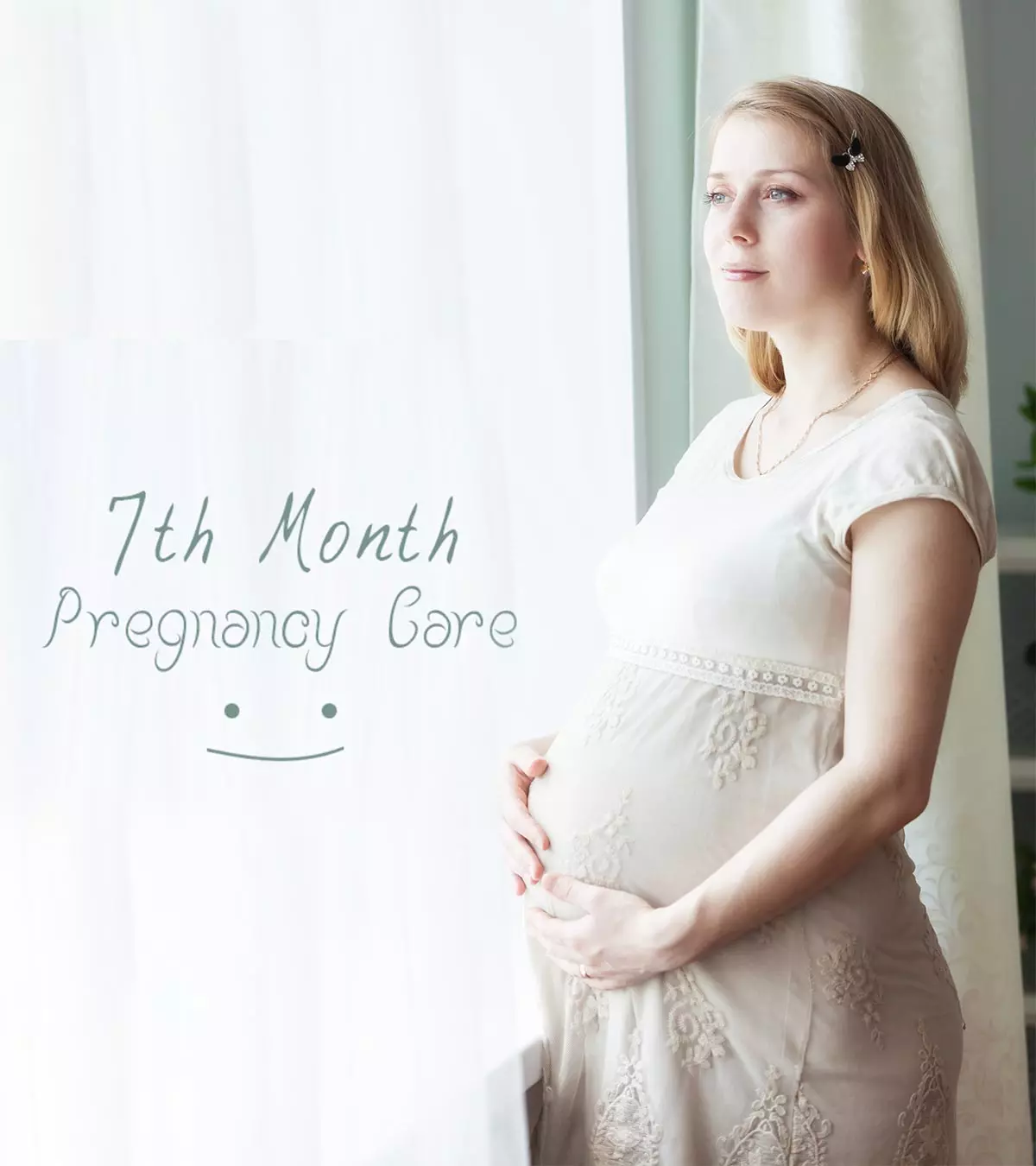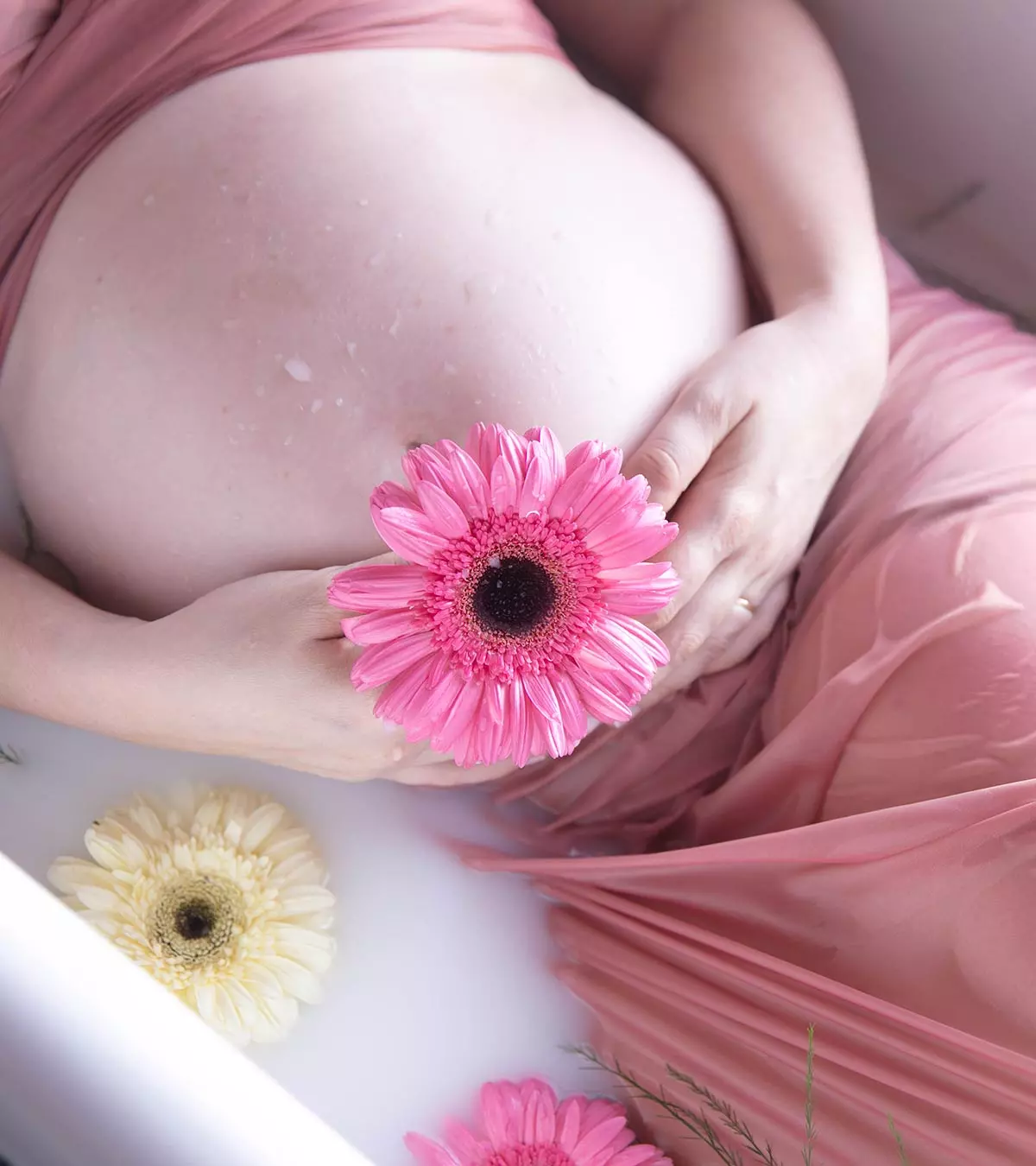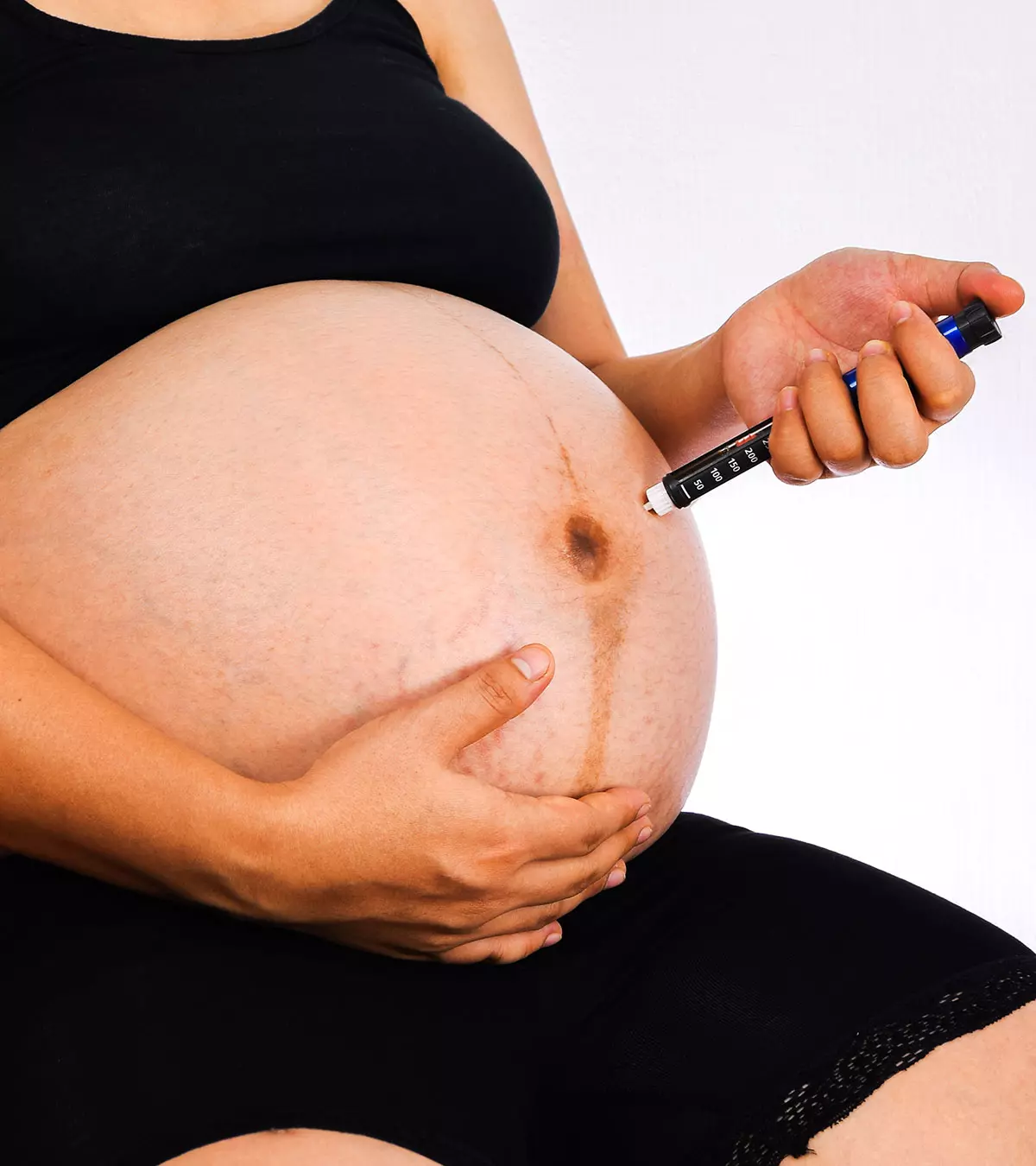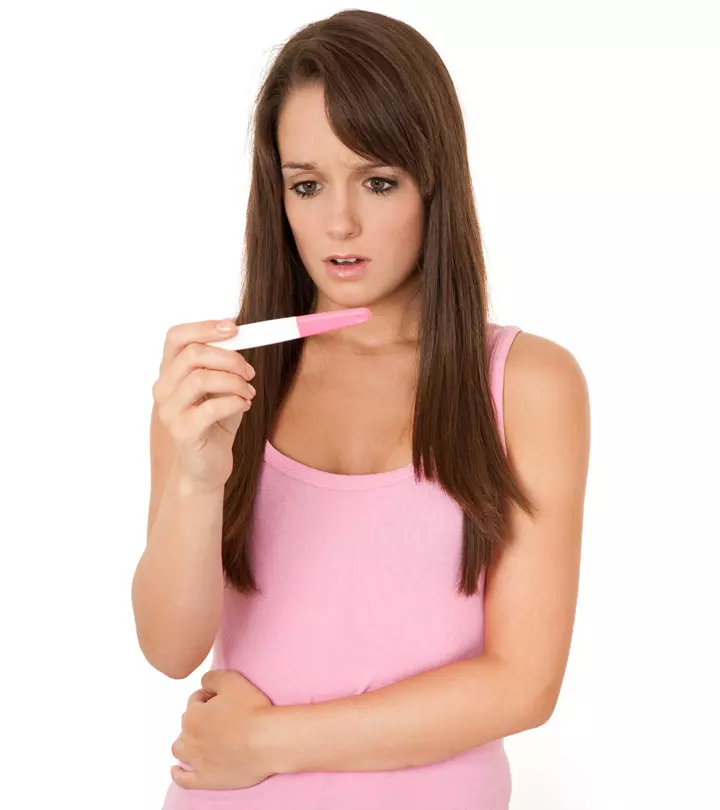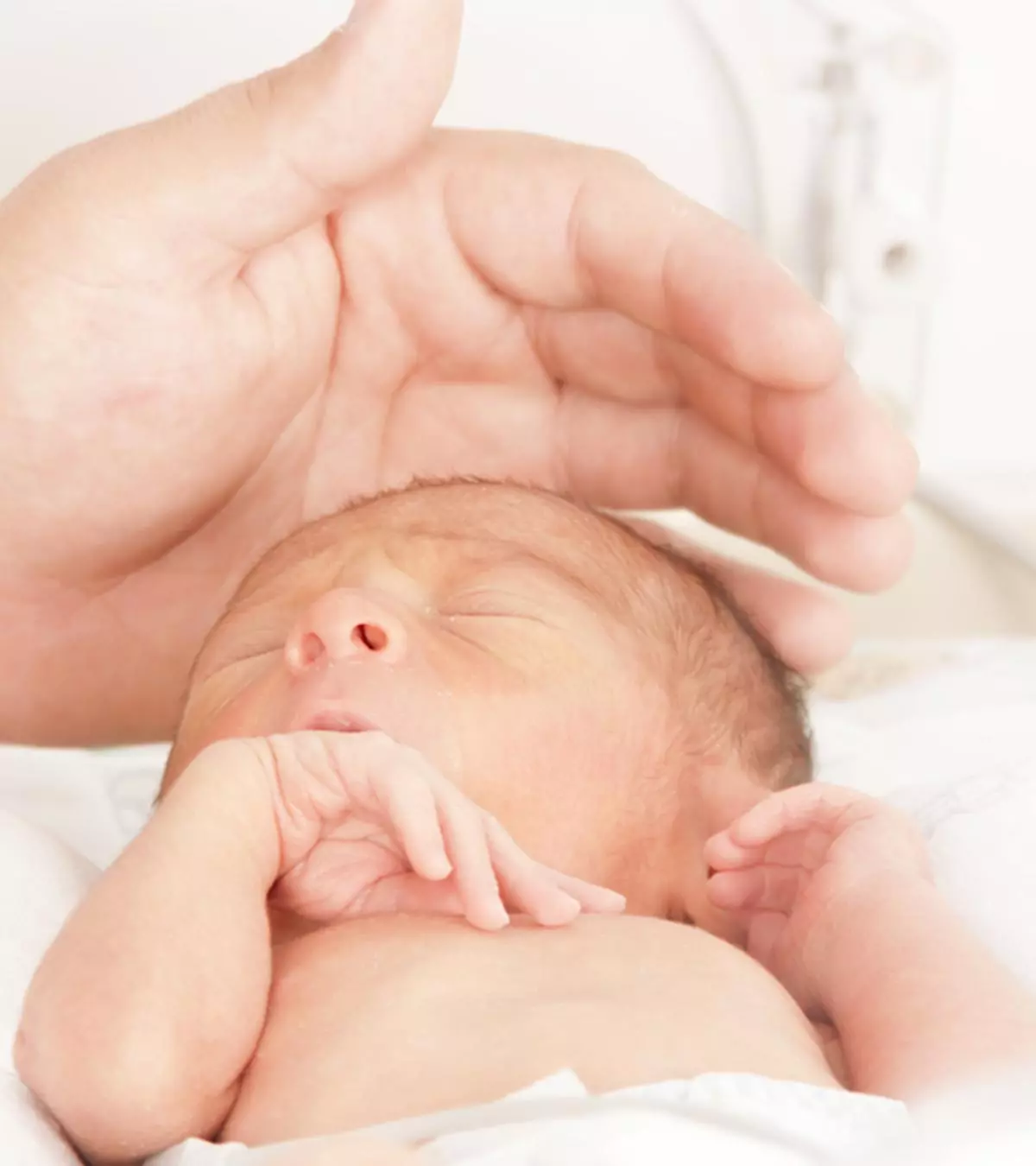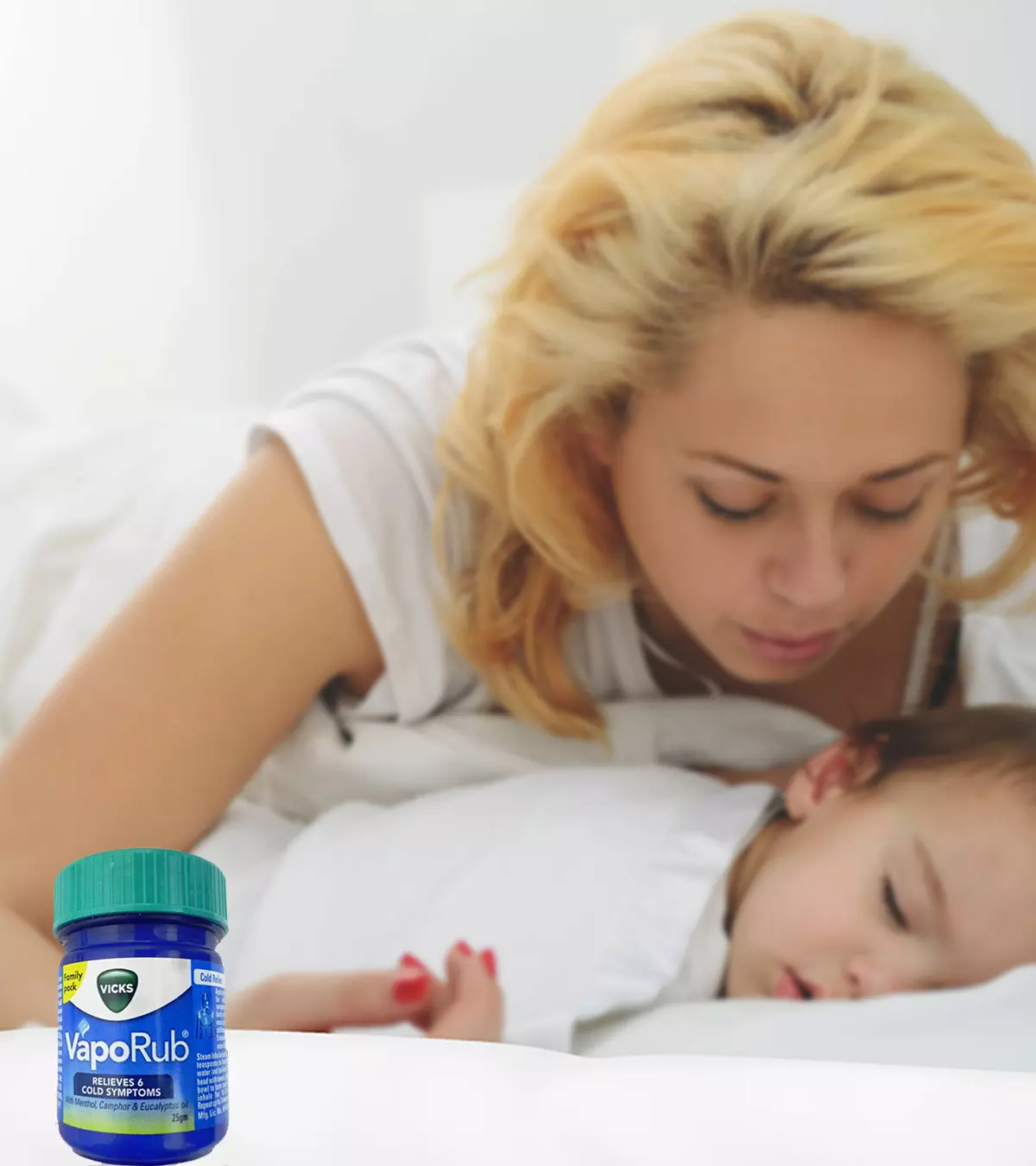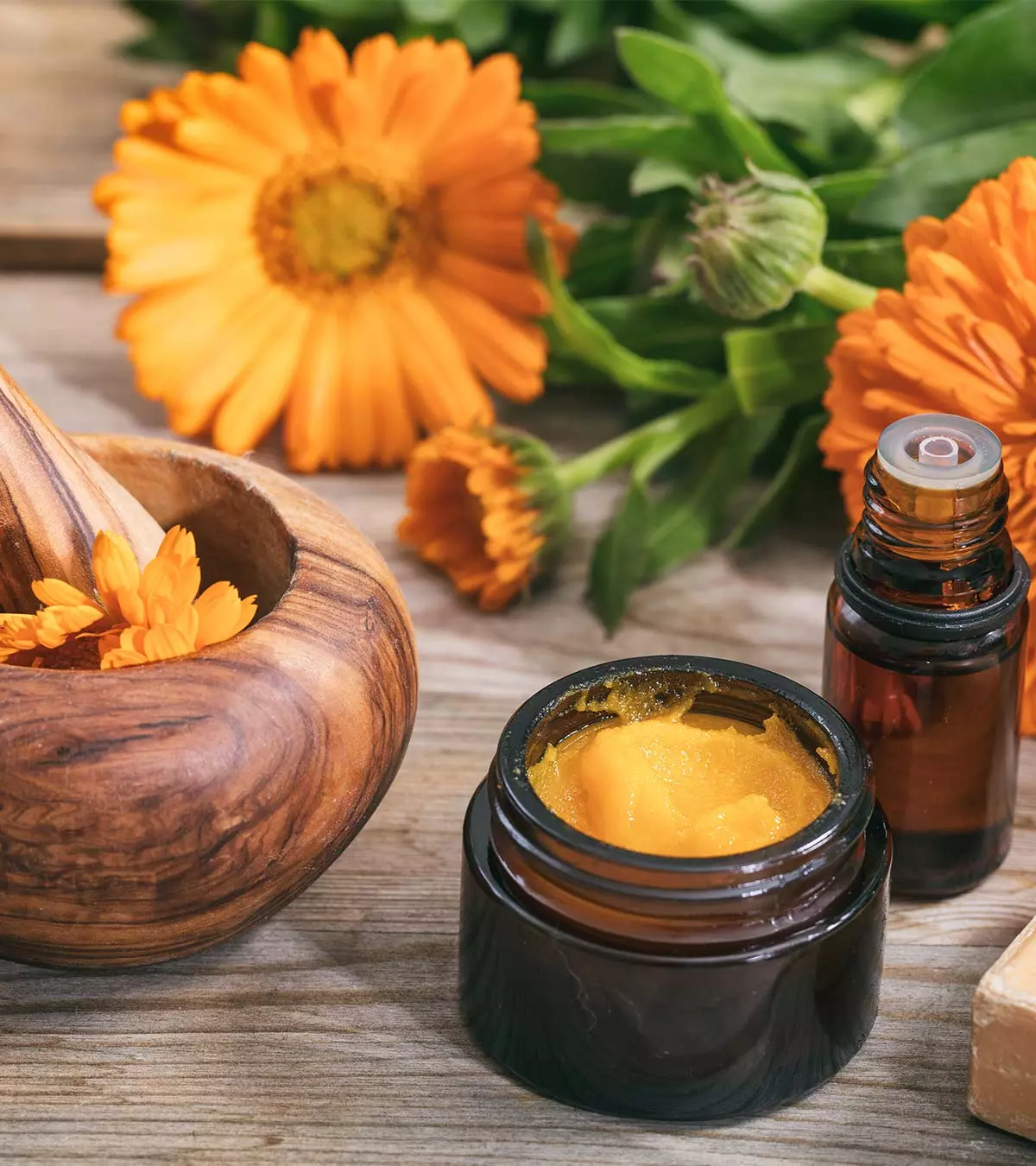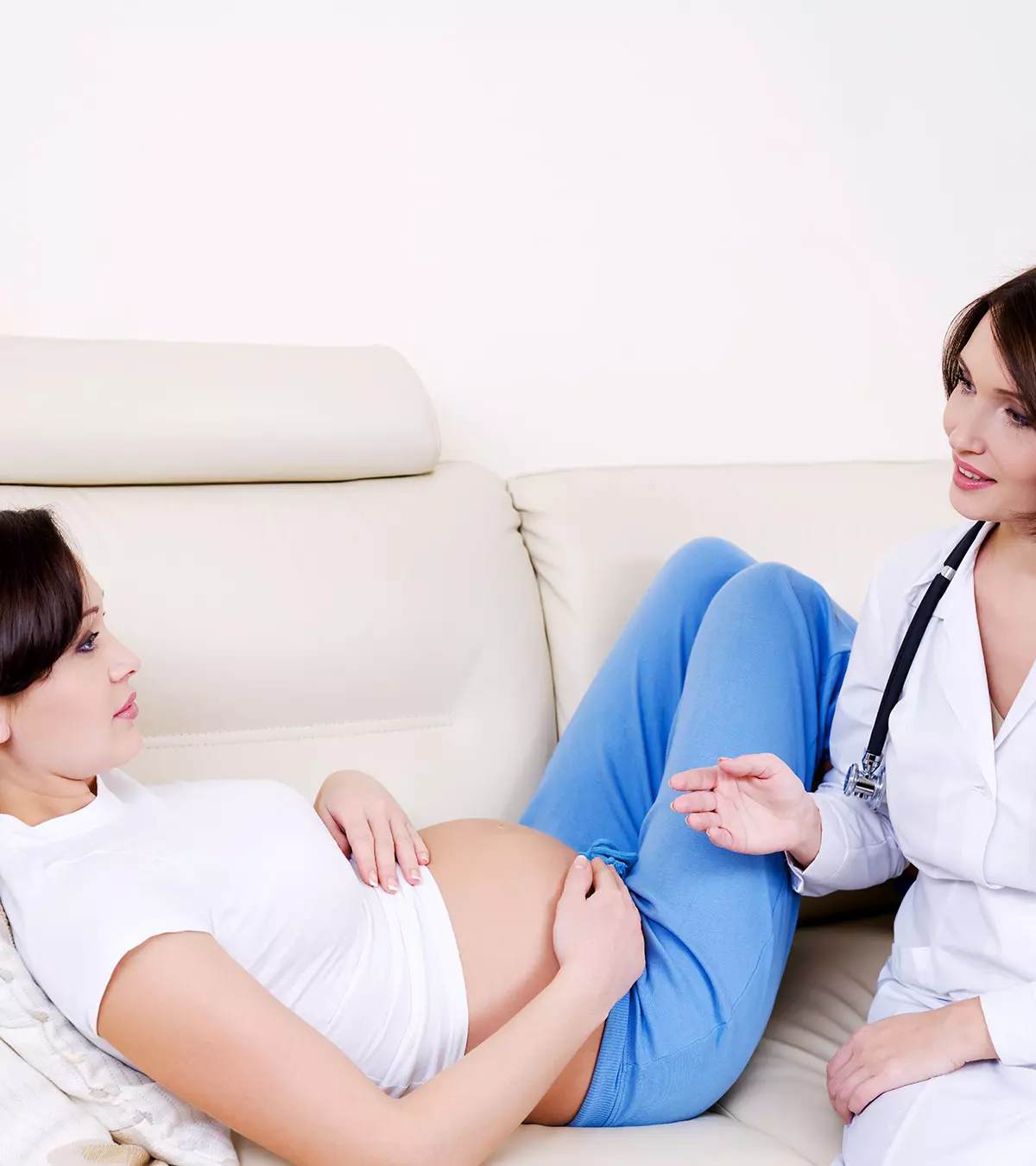
Image: Shutterstock
Vaginal thrush makes the vagina sore and itchy. It could become difficult during pregnancy as in some cases, it can pass on to your baby. MomJunction is here to give you all the information you need about yeast infection in pregnancy, and how you can manage it.

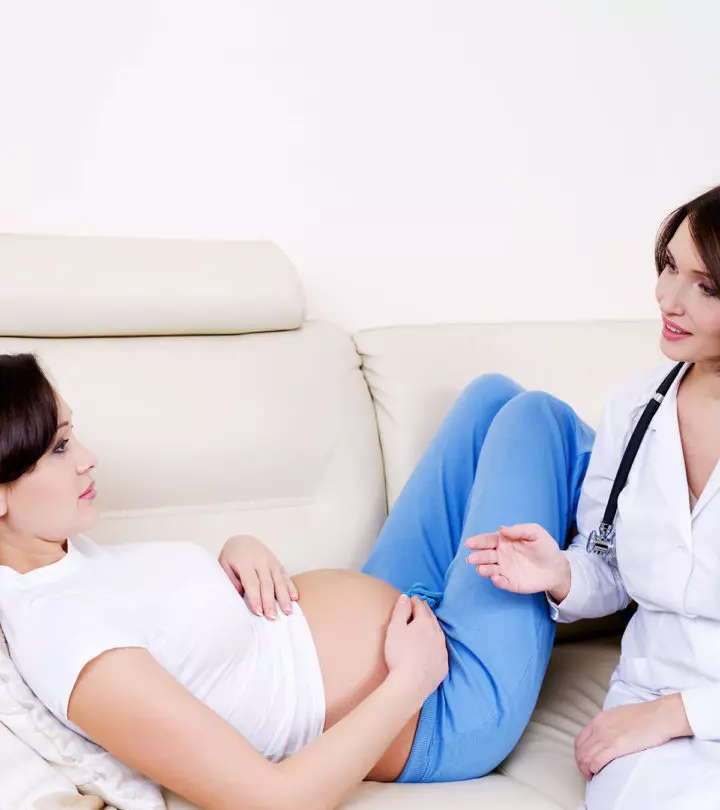
Click here to view an enlarged version of this infographic
Key Pointers
- Vaginal thrush, also known as vaginal candidiasis, is caused by an imbalance of microbes in the vaginal region.
- An increased sugar content in vaginal discharge and chemical changes during pregnancy can lead to a higher prevalence of yeast infections.
- Individuals with compromised immune systems and those using long-term nutritional supplements may develop gastrointestinal and blood-borne diseases as a result of yeast infections.
- Doctor-prescribed medications, as well as home care measures, can help manage yeast infections.
- Maintaining good intimate hygiene, refraining from douching, and avoiding the use of chemicals in the genital area can help prevent yeast infections during pregnancy.
What Is Yeast Infection?
Yeast infection is a fungal condition due to an abnormal growth of yeasts in certain parts of the body, including the mouth, throat, and vagina, causing symptoms and disease. When the yeast present in the vagina or intestinal tract starts to multiply, it is called vaginal yeast infection, also known as vaginal thrush or vaginal candidiasis (1) (14). This will alter the balance of microorganisms in the vaginal region, causing irritation (15).
What Causes Yeast Infection During Pregnancy?
The most common cause of yeast infections is a microscopic fungus known as Candida albicans (15). As long as it stays in a stable state, the fungus, which is naturally present in the intestinal tract and the vagina, doesn’t pose any issues to vaginal health. But certain conditions can disturb the fungi, leading to overgrowth of the yeast and other microorganisms as well.
The factors that are responsible for the yeast infection are:
- Higher estrogen levels: The high amount of estrogen secreted during pregnancy stimulates your vagina to produce glycogeniA combination of several glucose molecules that store energy and help regulate blood sugar levels in the body. . This makes it convenient for the yeast to infest and grow. Estrogen also propels the speed of the growth, enabling the yeast to stick to the vaginal walls (4).
- Antibiotics and steroids: Intake of antibiotics and steroids is another reason for yeast infection, especially if you take them for a long period (2). While killing the bacteria for which they are indicated, these drugs also affect the good bacteria present in the vagina making it vulnerable to yeast multiplication. Researchers from Maastricht University have outlined that approximately 80% of prescribed medications for pregnant women consist of antibiotics. In recent years, expectant mothers in various countries have received antibiotics significantly, ranging from 20% to 40% (16).
- Sexual intercourse: Unprotected sexual activity can trigger a sudden yeast infection. If your partner has the infection, it would get transmitted to you during the intercourse (a class=”citation_class” href=” https://womenshealth.gov/a-z-topics/vaginal-yeast-infections” rel=”follow noopener noreferrer”>3).
- High blood sugar levels: If you have diabetes, you are likely to have a weak immune system. This would make you susceptible to yeast infections as well as other diseases (4).
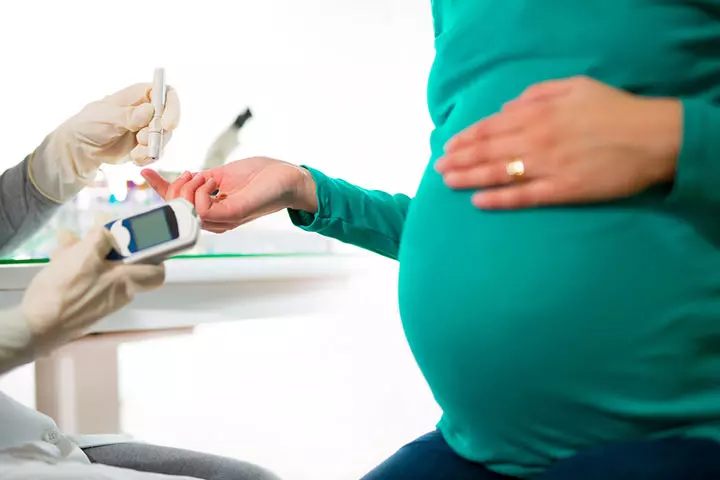
- Douching: It is a process wherein the genital region is cleaned with a mixture of vinegar and water to keep the body parts clean during pregnancy. But sometimes, douching may trigger the growth of bacteria and lead to some infections including yeast (5).
- Lack of hygiene: Not maintaining proper hygiene of the local parts.
Yeast infection can happen anytime between your puberty and menopause (a class=”citation_class” href=” https://womenshealth.gov/a-z-topics/vaginal-yeast-infections” rel=”follow noopener noreferrer”>3).
But you are more vulnerable during pregnancy.
 Did you know?
Did you know?Why Are Yeast Infections More Common During Pregnancy?
Your body undergoes several changes during pregnancy, and it is not easy for it to keep up with the chemical fluctuations in the vaginal region. Fluctuating pregnancy hormones and stress can also make pregnant women more susceptible to developing yeast infections (14). Also, the sugar content is high in the vaginal discharge, making the yeast survive and thrive (4).According to the American Pregnancy Association (APA), yeast infections mostly occur during the second trimester (8). The chances are relatively low in the first trimester.
Complications Of Yeast Infections
Yeast infection while pregnant is not always harmful, but in some instances, it may lead to adverse effects:
- If the pregnant woman has a weakened immune system, i.e., immunocompromised (for instance HIV infected), yeast infections, in addition to the vaginal infection, could lead to serious gastrointestinal infections which will spread throughout the bloodstream. A study by Johns Hopkins All Children’s Hospital and a collaboration between King Edward Medical University and Mayo Hospital Lahore revealed that approximately 5,000 HIV-positive women in the United States give birth each year. Additionally, the incidence of perinatal HIV transmission is remarkably low, standing at just 1.1 out of 100,000 live births.
- Those who are on long-term nutritional supplementation would develop fatal blood-borne infections.
Whether or not you have the complications, it is good to be alert towards any signs of the infection.
Symptoms Of Yeast Infection

The prominent symptoms of a yeast infection include (a class=”citation_class” href=” https://womenshealth.gov/a-z-topics/vaginal-yeast-infections” rel=”follow noopener noreferrer”>3) (8):
- Itchiness
- Soreness
- Burning and redness
- Swelling
- Odorless vaginal discharge that is white, creamy or cottage cheese-type in appearance
- Curdy white vaginal discharge with foul smelling
- Burning sensation while urinating
- Lower abdominal pain
- Swelling and redness of the vulva
You should not ignore these symptoms, exceptionally if they are persisting or recurrent. It is because they might be signaling towards some severe conditions such as bacterial bacterial vaginosisiDisease caused by an imbalance of beneficial and harmful bacteria in the vagina, causing vaginal itching and discharge. and sexually transmitted diseases. If you experience green, gray, or yellow discharge during pregnancy, along with itching and burning in the genital area, take it to your doctor’s notice.
Yeast Infection Treatment During Pregnancy
Yeast infection is curable when diagnosed at an early stage. Your healthcare provider will diagnose the condition by performing a physical examination and testing a sample of vaginal discharge during pregnancy. Home remedies can be used to treat mild cases, while medical treatment options are available for severe conditions or yeast infections in the second and third trimesters.
Home Remedies For Yeast Infections
Here are some natural products that will help you be free of the infection:
1. Yogurt:
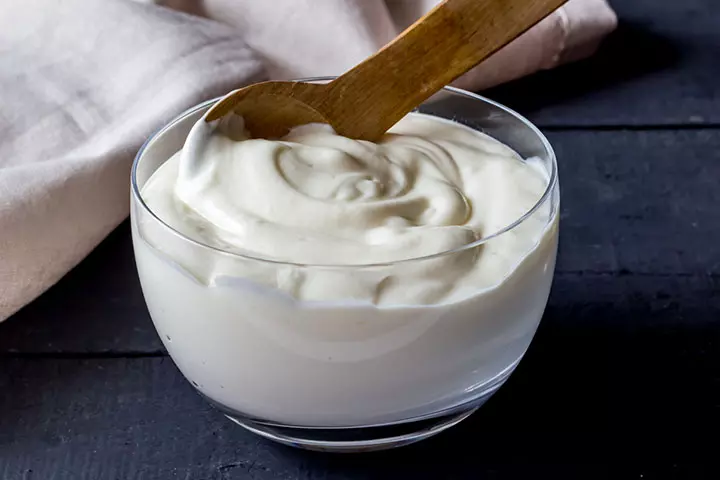
Yogurt, a probiotic, contains acidophilus and live bacterial cultures which stimulate good bacterial growth (6) (7).
You can consume it directly or apply vaginally. For the vaginal application, choose unflavored yogurt. It can be used once or twice a day until the symptoms disappear.
Nelly Maduka, an expecting mother and vlogger, shares how yogurt helps her deal with yeast infections. She says, “The secret to curing yeast infection for me is yogurt. Yogurt helps with gut health, and organic yogurts have live, active cultures inside them… I love yogurt and will have two or three yogurts a week. But in pregnancy, I have had yogurt in a day, and I have not yet had any yeast infections throughout this entire pregnancy (i).”
2. Garlic cloves:
The anti-fungal properties of garlic help treat the yeast infection.
Place a freshly peeled clove in the vagina during bedtime. You will also get gel supplements which you can apply in the vagina. You will get relief in the morning. If you have any bleeding problems, you should not use garlic, as it can aggravate the condition.
3. Honey:
Honey is known to multiply the good bacteria in the intestinal tract, and thus treat infections. You should use raw or unheated honey for best results.
Apply some honey on the affected vaginal region, and let it remain for half an hour. Rinse it off using warm water and allow the area to dry completely. You can do it twice a day until the symptoms are gone.
4. Apple cider vinegar:
This is also anti-fungal.
Dab the affected region with apple cider vinegar for quick relief. You can add a cup of apple cider vinegar in the bathtub and relax in it for half an hour. Another alternative is to mix it with plain water and apply on the irritated and inflamed areas. Leave for some time until it dries and rinse off the area using water.
5. Oregano oil:
Oregano oil contains flavonoidsiA group of naturally-occurring antioxidant and anti-inflammatory compounds found in certain plant-based foods. and phenols, which work in killing harmful pathogens and fungi. Also, the rich vitamins and nutrients in it strengthen your immune system. Therefore, it is the best remedy to treat candidiasis.
You can either take the oil orally or apply it on the affected region.
6. Calendula:
Here is another antifungal and anti-inflammatory product.
Apply some Calendula ointment or lotion on to the affected area. You can also crush a few of its leaves and use on the area. Repeat it thrice a day for complete relief.
7. Coconut oil:
The antifungal properties make it an excellent remedy for treating fungal infections.
Apply some oil over the affected area thrice a day for best results. You can also mix it with cinnamon oil.
8. Cranberry juice:

Unsweetened cranberry juice is known to treat urinary tract infections (UTI) during pregnancy, and therefore it can be used for treating yeast infections in pregnant women.
Consume 100% unsweetened juice to improve pH balance.
9. Tea tree oil:
Tea tree oil contains terpinen-4-ol which kills fungi causing candidiasis. It also has alpha-terpinene and gamma-terpinene, which help in preventing the spread of candida. It restores good bacteria in the body and treats inflammation. Though an excellent remedy, you cannot use it without diluting.
Add ten drops of tea tree oil to one liter of water, and use it as a vaginal douche. You can also use apple cider vinegar instead of plain water. Apply to the infected region twice a day. You may also add certain essential oils to vinegar-tea tree oil mixture.
10. Olive leaf extract:
The extract is anti-inflammatory, antioxidant, antifungal and antiviral. It helps restore good bacteria in the body.
Cut the leaves and immerse them in vodka. Store in a dark area for about a month. Strain the liquid and store it. You can apply to the affected region thrice a day.
You may try any of the above remedies if the infection is mild. However, note that there is little scientific evidence to prove their efficacy. Therefore, seek your healthcare provider’s advice.
In most cases, the infection lasts for a week or two. But if the symptoms do not go away within a couple of weeks, you should go for medical treatment.
Medical Treatments For Yeast Infection
Your doctor would prescribe medications based on the degree of the infection:
- Over-the-counter and antifungal medication creams and suppositories are usually safe. The commonly prescribed ones are Clotrimazole (Canesten, Gyne-Lotrimin) and Miconazole (Monistat) (1). These creams are applied in the vagina.
- Do not take any oral medications (such as fluconazole) for yeast infections without a doctor’s prescription. It is likely to increase the risk of congenital disorders such as autism in the baby.
However, some doctors may prescribe it in the second or third trimester, or after the baby’s arrival and while breastfeeding.
If you experience any irritation, talk to your doctor. Always complete the treatment course to make sure the infection does not come back. In general, it takes about 10-14 days for the infection to clear during pregnancy. The APA also recommends using starch-free drying powder, or Nystatin powder to prevent a recurring infection (8).
Note: Medications can treat yeast infections only for a temporary period. The infection will often recur until post-delivery, and requires repeated treatments.
Treating any form of yeast overgrowth involves a three-step process: controlling the overgrowth or killing the fungus; taking probiotics, such as Lactobacillus rhamnosus (good bacteria that prevent and treat yeast infections) (9); and a nutrient-rich diet.
 Quick fact
Quick factHow Long Do Yeast Infections Last?
Irrespective of the treatment, they do not last longer than one to two weeks. Using a starch-free drying powder or Nystatin powder after the infection has cleared and the sores have healed can aid in the prevention of future infections.
 Quick fact
Quick factHow To Prevent Yeast Infections During Pregnancy?
Yeast infection is irritating, to say the least. Take steps to avoid the problem through hygiene. Despite the influence of hormonal changes, you can take measures to maintain a dry genital area and facilitate adequate air flow.
Here are some tips to prevent yeast from spreading:
- Wear loose cotton undergarments, which allow air circulation near the genital region.
- Avoid wearing pajama bottoms and underwear during bedtime.

- Do not use scented soaps, bubble baths and hygiene sprays near the genital area. These things can increase the chances of infection.
- Keep yourself dry after activities such as swimming and shower. Ensure your genital area is completely dry.
- Avoid douching.
- Wipe front to back of the genital area with toilet paper. Back-to-front will increase the possibility of an infection.
- Do not sit in a wet bathing garment for a longer time.
- Eat a balanced diet containing a good amount of fruits and vegetables, whole grains, and non-fat dairy. Minimize the use of sugar and yeast products such as bread.
Can Yeast Infection During Pregnancy Affect The Baby?
No, yeast infections are not dangerous enough to affect your growing baby. But, if you have the infection at the time of labor, your child might contract it while passing through the birth canal. It will lead to yeast infection in the mouth, a condition known as thrush (10).
Your baby will develop white patches on the mouth — the sides, roof and also on the tongue. This fungus can come back to you when the baby is breastfeeding. However, the condition is not severe and can be treated easily. The treatment includes a mild antifungal medication for your baby and antifungal ointment for you.
What Happens When Yeast Infection Is Left Untreated?
Leaving a yeast infection untreated during pregnancy can cause a lot of discomfort.
- Women with this infection have the risk of delivering preterm and underweight babies.
- The infection can produce bad odor that is similar to the yeast smell we get from beer or bread.
Frequently Asked Questions
1. Will a yeast infection go away on its own during pregnancy?
While mild yeast infections may resolve on their own, it is recommended to obtain medical treatment during pregnancy. Timely treatment will help prevent any pregnancy complications and ensure the infection clears up in two weeks (8).
2. Can sperm cause a yeast infection?
In some cases, your partner’s semen may affect the pH balance of your vagina, leading to a yeast infection (11).
3. Can dirty fingers cause a yeast infection?
Yes. When your or your partner’s dirty fingers come in contact with your genitals, you are at an increased risk of contracting a yeast infection or other infections (12).
4. Can yeast infection damage the womb?
Vaginal yeast infection does not damage the uterus or affect the fetus. However, your baby may contract it during delivery if the yeast infection goes untreated during pregnancy (10).
Increased estrogeniA hormone responsible for the development and functioning of female reproductive organs. levels could cause a disbalance of bacteria and yeast in the vagina and result in yeast infection during pregnancy. Poor hygiene, antibiotic use, and high blood sugar levels are other common causes of vaginal yeast overgrowth. Soreness, burning, swelling, discharge, and vaginal itching during pregnancy are common symptoms of yeast infections. It is recommended to treat yeast infections in pregnancy to avoid complications since the immune system is weak at this time. Home remedies such as the application of unflavored yogurt, honey, apple cider vinegar, coconut oil, and cranberry juice to the vagina may reduce yeast growth. However, seek medical care and get antifungal medications and creams if homecare measures don’t improve the situation.
Infographic: Helpful Tips To Prevent Yeast Infections In Pregnancy
During pregnancy, hormonal fluctuations and bodily changes increase the risk of infections and diseases. Maintaining good hygiene and a healthy diet can indeed pave the way for good health. Check out the infographic below to learn about practical ways to prevent yeast infections during pregnancy.
Some thing wrong with infographic shortcode. please verify shortcode syntax
Illustration: Yeast Infection During Pregnancy: Causes And Symptoms
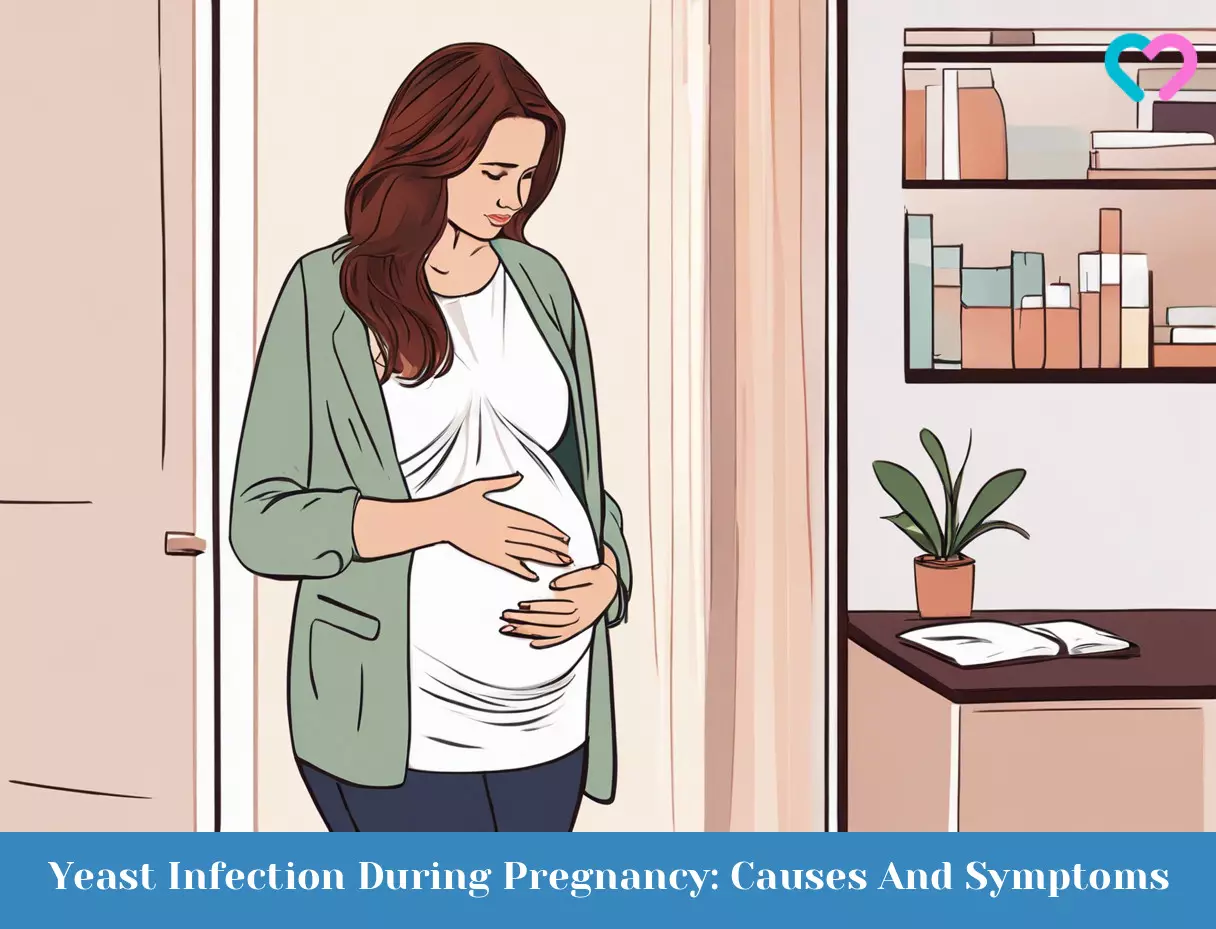
Image: Stable Diffusion/MomJunction Design Team
Yeast infections can affect pregnant woman. Learn about the symptoms, treatments, and prevention of yeast infections during pregnancy and how they can affect your baby.
Personal Experience: Source
MomJunction articles include first-hand experiences to provide you with better insights through real-life narratives. Here are the sources of personal accounts referenced in this article.
i. How to: yeast infections during pregnancy | my simple cure forever | no monistat.https://www.youtube.com/watch?v=THu2wpGmguM
References
- Derrick Soong and Adrienne Einarson; (2009); Vaginal yeast infections during pregnancy.
https://www.ncbi.nlm.nih.gov/pmc/articles/PMC2654841/ - Vaginal yeast infection (thrush): Overview.
https://www.ncbi.nlm.nih.gov/books/NBK543220/ - Vaginal yeast infections.
https://womenshealth.gov/a-z-topics/vaginal-yeast-infections - Iylia Liyana Sopian et al.; (2016); Yeast Infection and Diabetes Mellitus among Pregnant Mother in Malaysia.
https://www.ncbi.nlm.nih.gov/pmc/articles/PMC4975586/ - Jenny L. Martino and Sten H. Vermund; (2002); Vaginal Douching: Evidence for Risks or Benefits to Women’s Health
https://www.ncbi.nlm.nih.gov/pmc/articles/PMC2567125/ - Vaginal yeast infection.
https://medlineplus.gov/ency/article/001511.htm - Vaginal Yeast Infections – Women’s Health Guide
https://www.publichealth.va.gov/infectiondontpassiton/womens-health-guide/vaginal-yeast-infections.asp - Yeast Infections During Pregnancy
https://americanpregnancy.org/healthy-pregnancy/pregnancy-complications/yeast-infections-during-pregnancy/#:~:text=If%20left%20untreated%2C%20yeast%20infections - Should You Take Probiotics for Vaginal Health?; Cleveland Clinic
https://health.clevelandclinic.org/probiotics-for-vaginal-health - Vaginal Yeast Infections
https://www.publichealth.va.gov/infectiondontpassiton/womens-health-guide/vaginal-yeast-infections.asp - How do I prevent vaginitis?
https://www.plannedparenthood.org/learn/health-and-wellness/vaginitis/how-do-i-prevent-vaginitis - Can You Get an Infection From Fingering or Oral Sex?
https://kidshealth.org/en/teens/infections.html - Answers to 6 burning questions about yeast infection during pregnancy.
https://utswmed.org/medblog/yeast-infection-pregnant/ - Yeast infection.
https://www.cancer.gov/publications/dictionaries/cancer-terms/def/yeast-infection - Ranjana M S Gigi et l.; (2025); Vulvovaginal yeast infections during pregnancy and perinatal outcomes: systematic review and meta-analysis.
https://pmc.ncbi.nlm.nih.gov/articles/PMC10029297/ - Carlotta Gamberini et al.; (2025); Antibiotic Use in Pregnancy: A Global Survey on Antibiotic Prescription Practices in Antenatal Care.
https://www.mdpi.com/2079-6382/12/5/831
Community Experiences
Join the conversation and become a part of our nurturing community! Share your stories, experiences, and insights to connect with fellow parents.
Read full bio of Dr. Shashwat Jani
Read full bio of Rebecca Malachi
Read full bio of Swati Patwal
Read full bio of Aneesha Amonz







